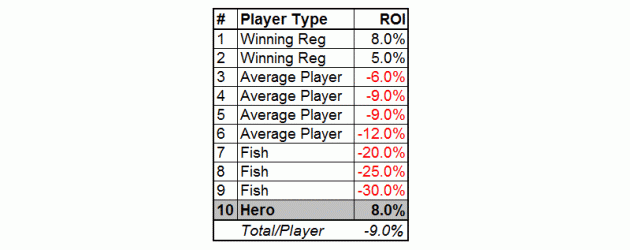One of those tools is the so-called Independent Chip Model or ICM poker. Essentially, it is an approach for converting tournament or SNG chip stacks to real money equity. It helps you make precise decisions, which bring positive expected value in the long run. Understanding the Independent Chip Model. In poker, the Independent Chip Model (ICM) uses the stack sizes of remaining players and the payout structure to calculate each player’s equity in the tournament. Independent Chip Model Definition. The independent chip model or ICM is a mathematical model for play in the late phase of a tournament with relatively small stacks. It is based on the idea that every chip represents a chance to land in the money and thereby to make a profit.
Online Poker » Poker Strategy » Tournament / Sit N Go » Independent Chip Model Part 1 The Independent Chip Model (ICM) is a mathematical approach to sit n go's and multi table tournaments. Chips are assigned a value based on the number of chips in play, the number of players left, stack distribution, the prize pool and payout distribution. If you have ever played poker tournaments, you have probably heard the term ICM. It stands for Independent Chip Model, but what is it actually? And how should it influence our strategy, if we are a cash game player mixing in some tournaments on the weekend or getting a ticket for a freeroll?
Independent Chip Model (ICM)
Poker Tracker 4 has several tools for work with ICM, such as “ICM Quiz” and “ICM Calculator”. Let’s consider them separately.
“ICM Quiz” is designed to train playing skills to Independent Chip Model. You can find “ICM Quiz” in “Tools” in main menu, and choose “ICM” and “Quiz”, like on the picture below.
In the opened window you can set up the varied parameters of the game situations, which you want to train.

In “Tournament Structure” you can choose structure of tournament. There are several templates with tournament prizes structure, such as “10 player SNG 50%/30%/20%”, “10 players DON”, “2 Player 100%” and others.
Also you can create your own prizes structure by pressing relevant button.
In the opened window you can edit and remove the existing tournaments types, and you can create your own tournament type. To do so you have to specify “Tourney Info” и “Prize Pool” in “Info” tabs.
On “Desc” tab you can indicate additional structure parameters, such as “Seats per Table”. Here you can choose “Full”, “6max” and “HU” tables. In “Total Tables” you can choose “MTT”, “SNG” or… In “Blind Speed” you can set up tournament table speed. Also, you can mark flags for tournaments, such as “SNG”, “DON”, “REBUY”, “STATELLITE”, “DEEP” and etc.
After all settings press “OK”.
Let’s return to “Quez Parameters”. Here you can set up “Number of Hands” for you training “Position” which you want to train, “Preferred Seating” (не очень понятен смысл). In “Hero’s Range” you can set up range, which you want to train. For example, “AA” or “72”, it’s pretty easy decision in any position. You can remove it from range.
Also, you can indicate Minimum and Maximum Players at the table and “Blind Structure”.
You can also choose the type of opponent, which depend on the opponent range. With it opponent will close your “Open Push”. You can choose “Average”, “Loose”, “Tight” and etc. Click “advanced” to combine several kinds of opponent in one type.
After all settings press “OK” and in each Replayer window choose “Push” or “Fold” answer, or press “Quit” for premature quit.
After answer on all questions you will see the following window with the results.
In this window you can see what was necessary to do in every situation and consideration of your variant with Independent Chip Model. Here you can make double-click to review hand.
ICM Calculator
This section will be helpful to calculate the value of the stack according to Independent Chip Model. You can find “ICM Calculator” in “Tools” in main menu, and choose “ICM” and “Calculator”, like on the picture below.
Here you can calculate Prizes in Pool% and in the Money.
For calculation in $ you need to enter “Buy-In”, “Fee” and “Bounty”. Also, you can save or import “Player/Chips/Results” in .xml foramt. After entering parameters in “Info” and “Desc” tabs, press “Calculate” and you will see the following result (like on the picture).
Image Credit - Fab Fotos
Tournament poker can be very exciting. Both recreational players, as well as poker veterans, like to dabble in the occasional sit'n'go or multi-table tournament even if they don't play tournament poker very often or they don't know much about it. Since poker goes hand in hand with curiosity and competitive spirit it usually doesn't take that long for an average player to learn about the three mysterious letters - ICM. So what excatly is ICM or better yet, what is the independent chip model? In this article, you'll learn what ICM is and why it can be useful in the tournament poker context.

What is ICM?

Prize Pool Equity and ICM
- Player 1 - 6000 chips
- Player 2 - 4000 chips
- Player 3 - 2500 chips
- Player 4 - 1000 chips
- Player 1 - 32.02$
- Player 2 - 27.06$
- Player 3 - 21.24$
- Player 4 - 9.68$
ICM Calculator is Your Friend
At this point, you probably realized that ICM is fairly complicated and you're wondering when will those pesky math equations show up? Fear not, ICM calculations can get really tedious really fast so there's no point in ever calculating them the hard way. ICM calculators greatly simplify the process and there's really no reason not to use them. You don't have to know exactly how the internet works to use it effectively and you're proving that by reading this article.Same goes for ICM, the inability to calculate it 'by hand' doesn't have to impair your ability of actually using it.
cEV vs $EV
Fortunately, we can use something called money EV ($EV) which basically represents how much extra money we can expect to gain in the prize pool equity when we make a certain play. If that amount is higher than the prize pool equity we'd retain if we decided to fold, we should make the play.
Why ICM?
ICM is basically the answer to the age-old tournament poker question: 'should we risk our chips in this spot?' which becomes especially important as we approach the money bubble. ICM can greatly improve your results in crucial stages of any tournament. Since ICM is basically impossible to calculate on the fly, if you want to gain a deeper understanding of the subject you have to study using a software that can work as an ICM calculator and quiz you on the subject.ICM Trainer is one of the many options and you can read the review of this program on our site. If you're a Poker Tracker 4 user you can use the built-in ICM Calculator and ICM Quiz features of the software. There's also a program called ICMIZER 2
Poker Independent Chip Models
used by many tournament players. So there you have it, you should now have a better answer to the question 'what is the independent chip model' and how to use ICM.More Top Rated Content
Articles
- Poker and Rational Thinking - Part 1
- GTO Aggression in Poker
- How To Check Raise Flops
- Leakfinder Review for Minerboy23 - 10nl Cash on Boyle Poker
Poker Independent Chip Model Anchor Chart
